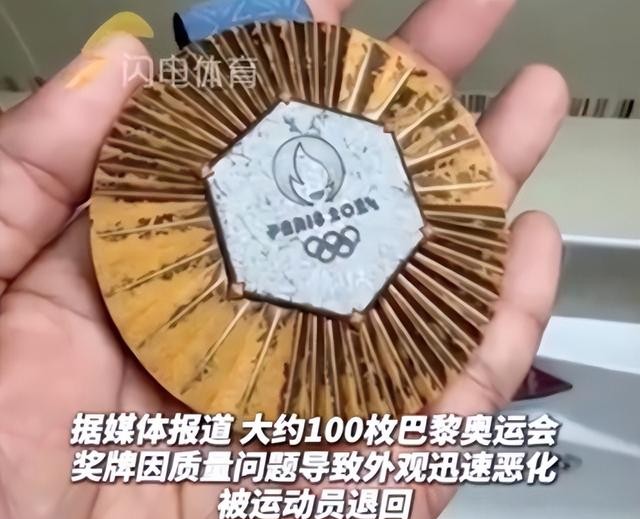In the eyes of every professional athlete, reaching the Olympic stage is the ultimate goal, and winning a medal in the Olympic competition is seen as the pinnacle moment of their career.

However, recently, many athletes who won medals at the Paris Olympics are finding it hard to be joyful.

On January 14th, news that over 100 Paris Olympic medals were returned quickly trended on social media, leaving many netizens surprised: Why would these athletes, who worked so hard to win medals, have them taken back half a year later?

In fact, the decision to recall the medals was not the original intention of the French Olympic Committee; it was only after many athletes voiced their concerns that France agreed to take back the medals.

As early as mid-August 2024, American skateboarder Houston, who won a bronze medal, posted a video online claiming that just ten days after receiving the medal, its condition had significantly deteriorated, with the plating starting to peel off and the surface looking dull.

Subsequently, a member of the French relay swimming team also shared their bronze medal online, finding that its condition was even worse than Houston's, with severe oxidation and paint peeling, leading netizens to jokingly compare it to "crocodile skin" or a newly unearthed "ancient relic" from Paris, but it was hard to believe this was a medal won just half a year ago.

In fact, two weeks after the opening of the Paris Olympics, the organizers knew there might be issues with the medals. Irish rower Lynch revealed that his medal was forcibly recalled by the Olympic Committee for quality inspection.

During the entire Paris Olympics, 5084 medals were produced by the Paris Mint, each containing 0.04 pounds of fragments from the Eiffel Tower. The design of the medals was undertaken by the famous Parisian jeweler "Chaumet," with each gold medal strictly using 6 grams of gold and 505 grams of pure silver, valued at over 7000 yuan RMB per piece.

Although this seems very sincere, the French Olympic Committee barely passed the review, as according to the requirements of the International Olympic Committee, each gold medal must contain no less than 6 grams of gold.

Seeing an increasing number of Olympic medals with problems, the French Olympic Committee decided to fully recall the problematic medals. It is understood that the Paris Mint responsible for manufacturing the medals had discovered defects in the varnish at least fifteen months prior but still chose to continue production. After the incident, all three directors of the mint resigned.

After this incident, many people thought of the gold-inlaid jade medals from the Beijing Olympics, calling them "increasing in value."

In 2021, a fire broke out in Russia, and the home of Russian gymnast Daria was unfortunately destroyed. However, during the cleanup of the fire debris, she found that her artistic gymnastics gold medal from the 2008 Beijing Olympics was intact.

In this fire, the "gold-inlaid jade" medal showed no signs of smoke damage, and even the ribbon was as good as new, with the surface still radiating a warm luster, showing no signs of time's passage.

The "gold-inlaid jade" medals not only integrate China's excellent historical culture but also allow each Olympian to feel China's full sincerity. Not only the surface of the medals but also the ribbons are made of 38% silk and 62% polyester, woven with precision, and treated with nanotechnology to effectively prevent fire and pests.

Each Olympic medal has its own unique qualities, but they can clearly reflect a country's hospitality. China has always maintained the demeanor of a great nation, welcoming every friendly "guest." In contrast to France's medals, there is truly no comparison without harm.

Conclusion

We hope that the French Olympic Committee will soon provide a reasonable explanation to these athletes. After all, for Olympians, they pour everything into winning this honor, and the organizers should treat the medals, which are a symbolic keepsake, with care. Do not let the Olympics become a "shame of Paris," nor let the hearts of the Olympians grow cold.
